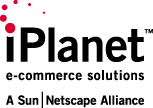IPlanet
 |
|
| Owner | Oracle Corporation |
|---|---|
| Introduced | January 1996 |
| Markets | E-commerce |
| Previous owners |
|
| Website | www |
iPlanet was a product brand that was used jointly by Sun Microsystems and Netscape Communications Corporation when delivering software and services as part of a non-exclusive cross marketing deal that was also known as "A Sun|Netscape Alliance".
After AOL merged with Netscape, technology analysts speculated that AOL's major interest was the netscape.com website (specifically the millions of registered users thereof), and to a lesser extent the Netscape Communicator suite, which some considered would be used to replace the Internet Explorer browser which AOL licensed from Microsoft and included as part of their software suite.
AOL entered into an agreement with systems and software company Sun Microsystems whereby engineers from both companies would work together on software development, marketing, sales, installation and support. Part of the deal was that Sun agreed to pay Netscape a fixed amount for each year of the deal regardless of whether any software was actually sold by the alliance. The code was written after the best parts of the Netscape Enterprise Server and the Sun Java System Web Server had been merged.
The iPlanet brand was already owned by Sun following the acquisition of i-Planet, Inc. in October 1998 (i-Planet was founded just two years before in January 1996).
In 2002, the three year alliance came to an end, at which point, under the terms of the deal, both AOL and Sun retained equal rights to the code that had been jointly developed. Around this time many of the remaining Netscape employees were either laid off or transferred to Sun (mostly at its campuses in Santa Clara, California and Bangalore). During the period of the alliance, Netscape had hired very few people, most staff coming under the Sun umbrella.
AOL had continued to market the directory and certificate server products under the Netscape brand. But in 2004 AOL sold the directory and certificate server products to Red Hat, which open-sourced them and integrated both into its Red Hat Enterprise Server product portfolio (Red Hat Directory Server and Certificate System).
...
Wikipedia
